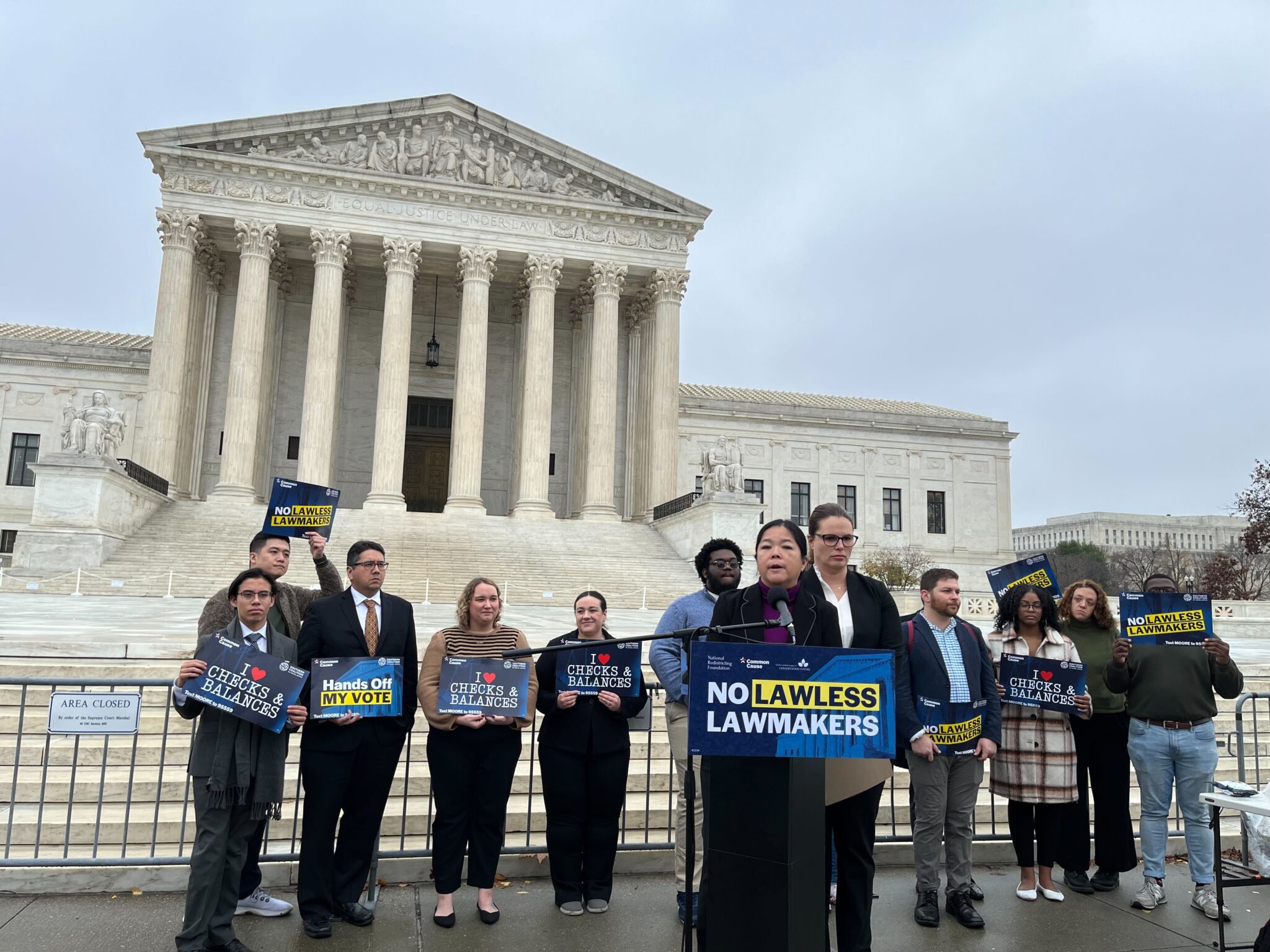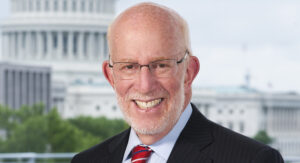Blog Post
Left, Right and Center Agree: Moore v. Harper Puts Our Democracy at Risk

The Supreme Court will make its decision any day in Moore v. Harper, Common Cause’s major voting rights case. It has the potential to do away with critical checks and balances that stave off partisan power grabs.
We at Common Cause have sounded the alarm bell about the dangers of this case, and found broad support from court watchers and legal experts equally concerned about the far-fetched “independent state legislature theory (ISLT).”
What is ISLT?
- A fringe idea claiming the Elections Clause gives state legislatures absolute power to manipulate election rules.
- It would let legislatures create rigged voting maps, without having to face the scrutiny of state courts ensuring compliance with existing state laws.
- It would let state legislatures in all 50 states manipulate election laws to preserve partisan power.
That’s why nearly 70% of the 69 amicus briefs (friend-of-the-court briefs) filed in Moore were in favor of preserving checks and balances in our election systems.
Support came from retired high-ranking military leaders; a bipartisan group representing the top judicial officials in the 50 states; Steven Calabresi, co-founder of the Federalist Society; former Calif. Gov. Arnold Schwarzenegger, Republican election law expert Ben Ginsberg, Republican elected officials including former U.S. Rep Barbara Comstock (R-Virginia), and the libertarian Niskanen Center, a think tank named after Ronald Reagan’s economic advisor.
But don’t take our word for it, below are what our conservative allies in the fight to preserve American democracy had to say.
- “The independent state legislature theory has literally no support in the Constitution, the pre-ratification debates, or the history from the time of our nation’s founding.” Judge J. Michael Luttig, former federal judge on the U.S. Court of Appeals for the Fourth Circuit and a member of Common Cause’s Moore v. Harper legal team.

- States would lose “any ability to enact meaningful checks and balances on congressional redistricting to prevent harmful gerrymanders that prioritize partisan advantage or incumbent protection.” Arnold Schwarzenegger, former Republican Governor of California
This is my amicus brief in Moore v. Harper, the test of the so-called independent state legislature theory at the Supreme Court. You have to be polite at SCOTUS, but here are my unfiltered thoughts. Frankly, this theory is nuts. 1/4 https://t.co/Np9KuoUdcT
— Arnold (@Schwarzenegger) October 26, 2022
- “In short, [The ISL theory] would upset settled expectations and create untenable legal uncertainty around elections; cause confusion for election administrators and voters; increase the odds that state legislatures replace the popular vote with their own political preferences; and flip our system of state and local control of elections on its head by making federal courts resolve election disputes—many in an emergency posture—at an unprecedented scale; all at a time when our country can least withstand it.” Ben Ginsberg, Republican election law expert

- “Say what you will about the ISLT as a political device for the accumulation of power, but there is absolutely nothing about the theory that ought to appeal to conservative lawyers. The hallmarks of conservative legal thought are textualism, originalism, historicity, and judicial modesty. The ISLT comports with none of these.” Paul Rosenzweig, principal at Red Branch Consulting, a former deputy assistant secretary for policy at the Department of Homeland Security
- “The independent state legislature theory will harm election integrity and weaken public faith in elections. Its adoption poses threats to national security and will also serve to disenfranchise military voters.” A group of 10 retired four-star admirals and generals, and past service secretaries of the U.S. Armed Forces.
- “This is a huge national power grab because it suddenly says, those state constitutions don’t matter in determining what the state law-making process is. Instead the accidental fact that the elections clause uses the word legislatures somehow trumps state constitutions, gubernatorial vetoes and state judicial review.” Steven Calabresi, co-founder of the Federalist Society.

The Supreme Court will let us know their decision soon, likely by the end of June. But while we at Common Cause are hopeful the Court’s Justices will side with us, we know there is much work to be done to protect our democracy from attacks like this one.
It’s why we continue to push for states to adopt fair and equitable approaches around redistricting and are calling on Congress to pass meaningful voter protections to ensure our democracy keeps power where it was intended to be, with the people of this country.
Join us here.
